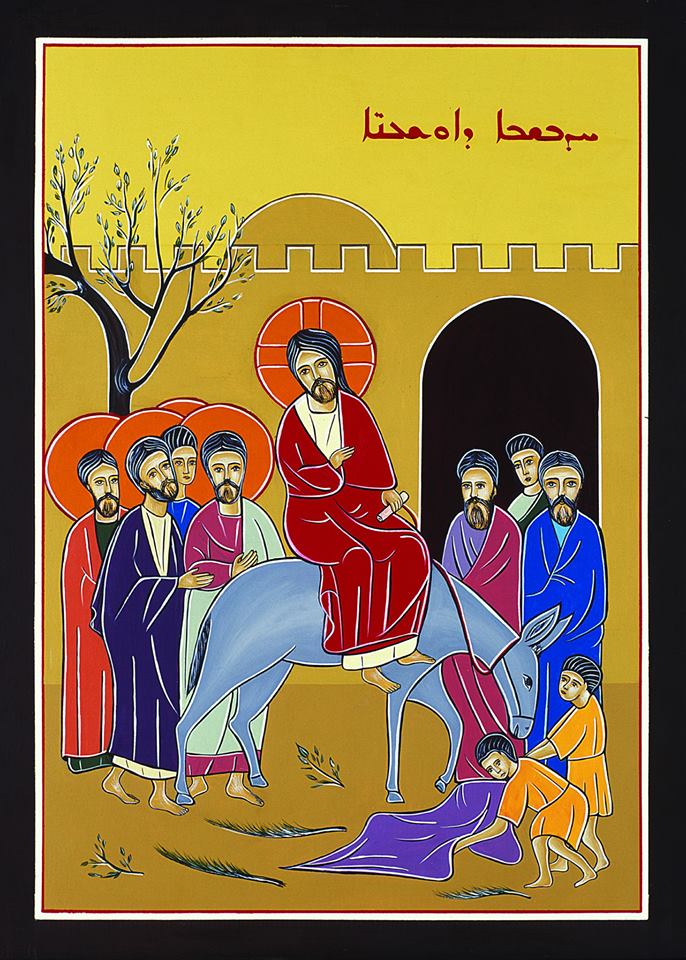
Author: Mary-Anne Boustany
My earliest memories of attending church with my family are of Hosanna Sunday, also called Palm Sunday.
We would spend the evenings leading up to the day decorating simple white candles with small branches from our olive tree and ribbons coordinated with our Hosanna Sunday outfits, which would almost always be new.
In the Maronite liturgical tradition, the day is a joyful occasion from the beginning of the Liturgy to its concluding procession around the church with children held up on shoulders and all sing “Hosanna, Hosanna, in the highest.”
The church is overflowing with the faithful. The children carry their candles, symbolising Jesus as the light of the world.
Their excitement is palpable and they are ready to welcome their King who claims and commands all things, waving olive and palm branches.
The Liturgy begins with the typology foretold in Zechariah 9:9, of the prophecy being fulfilled.
“Who is the great King who comes, spoken of in prophecy? As he rides a donkey’s colt, crowds spread cloaks along his way.
With palms children go to meet their Lord and King, and they shout with joy,” we sing in our entrance hymn.
Christ’s triumphant entrance into Jerusalem is indeed the greatest cause for celebration.
For it proclaims the beginning of His new covenant with all of humanity, and we enter into Passion Week, anticipating the joy that is to come, the victory of Christ over death, His glorious resurrection.
The community comes together to profess its faith, that Jesus has come for all, rich and poor, to fulfil a prophecy and become the sacrificial lamb.
In our Maronite tradition, we also mark the rite of the “arrival at the harbour,” on the evening of Hosanna Sunday.
This reminds us that the ark, representing the church, is arriving safely after its Lenten journey to the harbour of salvation, which is Christ himself.
St Ephrem the Syrian writes that the Lord, the master mariner, conquers the raging sea.
In the example of the five wise virgins awaiting the bridegroom, the Maronite faithful gather outside the closed doors of the church with candles. Following a candle procession, the priests and clergy pray and sing hymns.
Five women—representing the five wise virgins—are selected from the congregation to hold lanterns. The priest knocks three times on the church door before it is opened to let everyone in.
This is to remind us that having practiced good deeds, fasting and almsgiving during Lent, we are now ready to meet the bridegroom and enter with him into the heavenly feast.
As the prelude to Hosanna Sunday and Passion Week, Lent isn’t just about strengthening our will to show our love for God through sacrifice.
Rather, it is about using those sacrifices to draw closer to Christ, and readying ourselves so that when the time comes, we may be prepared like the five wise virgins, for Jesus’ return.
Although I am passing on the joy of Hosanna Sunday to my children, through our simple traditions like decorating Hosanna Sunday candles, I am more committed to helping them “get closer to Jesus.”
I remind myself and them, that they need not be afraid of pursuing the truth and living it out. They need not worry what the world thinks of them, only what our Lord thinks.
I also teach them that they are compelled to treat every person with respect, and to explain devotedly and lovingly why we believe the truths of our faith.
May we enter Passion week with an open heart, like the joyful children raising their candles and waving their branches.
We journeyed in the “ark of Lent” to ready ourselves to receive Christ, for he is our salvation, our safe harbour. We welcome You Lord, into our lives, we are renewed, so that we may be ready to stand beside you as you fulfil your prophecy, to be sacrificed for our sins.
Mary-Anne Boustany is a Maronite Catholic mum of four living and working in Western Sydney.


